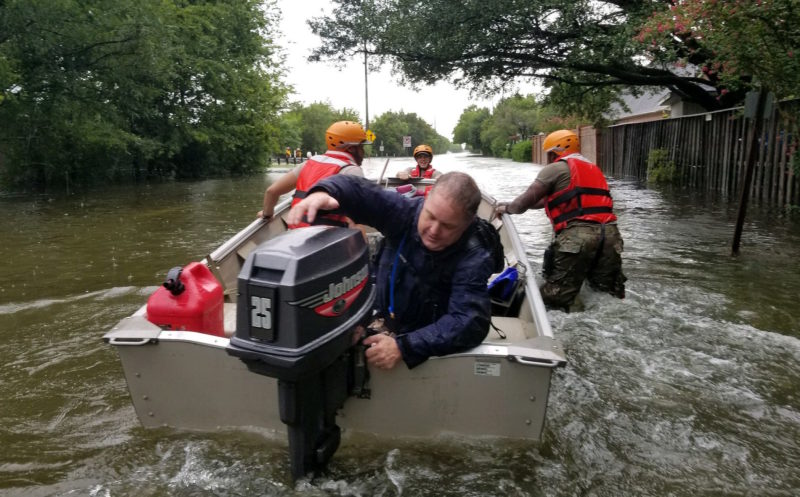An exchange of letters between a rural county in North Texas and the Texas Attorney General’s Office is shedding light on one of the more obscure features of the Texas Disaster Act of 1975, the law that officials have relied on to craft emergency ‘stay home’ orders.
The coronavirus pandemic has touched off a debate over emergency powers and raised concerns about the balance between civil liberties and government power in times of crisis.
How far can officials go under the Disaster Act? Can they control movement of persons? Prevent businesses from opening? Commandeer private property? Is the law even constitutional?
Hood County Attorney Matthew Mills raised such questions in a letter to the Attorney General on March 30, asking for a formal opinion on whether local officials “may commandeer private property.”
The Attorney General replied, in short, that local officials cannot commandeer private property in a disaster, though the Texas governor can. The Disaster Act “does not authorize a county judge, a mayor of a municipality, or any other local government official to commandeer private property to respond to a disaster,” the Attorney General wrote in a formal opinion letter.
However, Section 418.017(c) of the Disaster Act says, “The governor may commandeer or use any private property if the governor finds it necessary to cope with a disaster, subject to the compensation requirements of this (law).”
So, a governor could seize your boat or truck for use in a hurricane evacuation, for example. If he did so, however, he would have to pay you for the use of it, and for any loss or damage. The law says that this compensation may be decided by mutual agreement, or failing that, in the same manner that the state computes compensation in eminent domain cases.
The origins of this ‘commandeering’ law actually go back before the 1975 Disaster Act, to a predecessor statute called Vernon’s Annotated Codes and Statutes 6889-7. However, a copy of the original law isn’t available online (it may be available in law libraries). At time of writing, Honest Austin was not able to obtain a copy or determine its precise date of origin.
‘The Governor’s Designated Agent’
Rulings by the Attorney General’s Office are supposed to help bring clarity to obscure passages of law, but in this case there is still arguably some doubt. A section of the Disaster Act, 418.1015, actually does appear to grant local officials the same powers as the governor in a state of emergency.
It says that a county judge or mayor serving as the “emergency management director” in his jurisdiction “serves as the governor’s designated agent in the administration and supervision of duties under this chapter. An emergency management director may exercise the powers granted to the governor under this chapter on an appropriate local scale” (emphasis added).
The Attorney General argued in his letter that this provision should not be interpreted too broadly: “The Legislature expressly conferred some, but not all, of the extraordinary emergency powers given to the Governor to local government authorities. ‘When the Legislature uses a word or phrase in one portion of a statute but excludes it from another, the term should not be implied where it has been excluded.’ R.R. Comm’n of Tex. v. Tex. Citizens for a Safe Future & Clean Water, 336 S.W.3d 619, 628 (Tex. 2011).”
“Without an express grant of authority to commandeer private property in section 418.108, we cannot conclude that section impliedly grants local government officials authority to commandeer property.”
In a footnote, however, the Attorney General’s Office added a touch of nuance, saying, “Our conclusion does not foreclose the possibility that local government officials could possess authority to commandeer private property in certain limited circumstances when serving as the Governor’s designated agent to respond to local disasters.”
“The Governor, through the disaster declaration, could authorize the designated ’emergency management director,’ which is the presiding officer of the governing body of an incorporated city or a county, to ‘commandeer or use any private property’ upon determining that it is necessary to cope with the disaster subject to the compensation requirements.”
“… Whether and to what extent local officials possessed the authority to commandeer private property would be decided on a case-by-case basis, considering the language of any relevant executive orders as well as the circumstances surrounding the disaster in question.”
AG opinions are not binding – only the state courts have the role of formally interpreting law – but they do represent an informed interpretation of the law on the part of lawyers within the Attorney General’s Office. Typically these opinions are crafted by the AG Office’s Opinion Committee, and issued in the name of the current attorney general, who in this case is Ken Paxton.
Given the general controversy and confusion around the Texas Disaster Act, the law is likely to draw scrutiny from the Legislature when it meets in 2021 and 2023. Some lawmakers already have criticized the law, in whole or in part. A separate provision of the Disaster Act is at the heart of a recent controversy involving a hair salon owner in Dallas.
Documents Cited
This article is part of Texapedia, the Encyclopedia of Texas Government. Information in this online encyclopedia is drawn from credible sources, including state laws, agency publications, reference books, historical works, the Texas Constitution, and a variety of well-known news sources.
